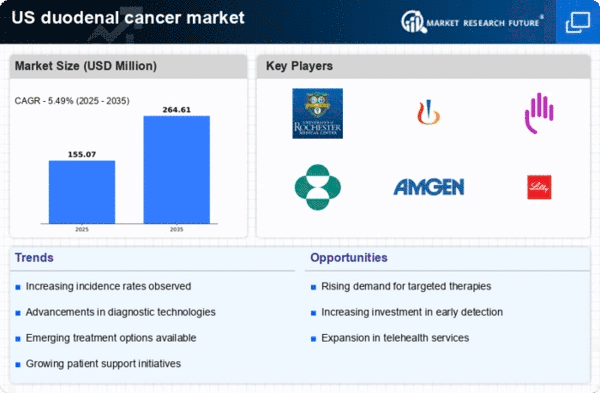Advancements in Treatment Modalities
Innovations in treatment modalities for duodenal cancer are significantly impacting the duodenal cancer market. The introduction of targeted therapies and immunotherapies has transformed the treatment landscape, offering patients more effective options with potentially fewer side effects. For instance, recent studies have shown that targeted therapies can improve survival rates by up to 30%. Additionally, minimally invasive surgical techniques are becoming more prevalent, allowing for quicker recovery times and reduced hospital stays. As these advancements continue to evolve, the duodenal cancer market is likely to witness a surge in demand for these novel treatment options, ultimately enhancing patient outcomes and quality of life.
Growing Incidence of Duodenal Cancer
The rising incidence of duodenal cancer in the US is a critical driver for the duodenal cancer market. Recent statistics indicate that the annual incidence rate has increased, with approximately 5,000 new cases reported each year. This trend is likely influenced by factors such as dietary habits, genetic predispositions, and environmental exposures. As awareness of this cancer type grows, healthcare providers are more vigilant in diagnosing and treating patients, which in turn fuels demand for innovative therapies and diagnostic tools. The duodenal cancer market is thus positioned to expand as more patients seek treatment options, leading to increased investments in research and development to address this growing health concern.
Rising Investment in Cancer Research
The increasing investment in cancer research is a vital driver for the duodenal cancer market. Funding from both public and private sectors has surged, with billions of dollars allocated annually to cancer research initiatives. This financial support is crucial for advancing the understanding of duodenal cancer, leading to the development of novel therapies and diagnostic tools. The duodenal cancer market stands to benefit from this influx of research funding, as it enables scientists and researchers to explore new avenues for treatment and prevention. As research progresses, the potential for breakthroughs in the management of duodenal cancer becomes more promising, ultimately enhancing patient care.
Regulatory Support for Drug Approvals
Regulatory support for the approval of new drugs and therapies is a significant factor influencing the duodenal cancer market. The US Food and Drug Administration (FDA) has streamlined processes for the approval of innovative treatments, particularly those addressing unmet medical needs. This regulatory environment encourages pharmaceutical companies to invest in research and development for duodenal cancer therapies. As a result, the duodenal cancer market is likely to see an influx of new products entering the market, which can enhance treatment options for patients and potentially improve survival rates. The proactive stance of regulatory bodies fosters a conducive atmosphere for innovation and growth.
Increased Awareness and Screening Programs
The heightened awareness surrounding duodenal cancer and the implementation of screening programs are pivotal drivers for the duodenal cancer market. Public health initiatives aimed at educating the population about the symptoms and risk factors associated with this cancer type have led to earlier detection and diagnosis. As a result, more individuals are being screened, which has been shown to increase the likelihood of successful treatment outcomes. The duodenal cancer market benefits from this trend, as early detection often correlates with a higher demand for therapeutic interventions and follow-up care, thereby expanding market opportunities for healthcare providers and pharmaceutical companies.
















